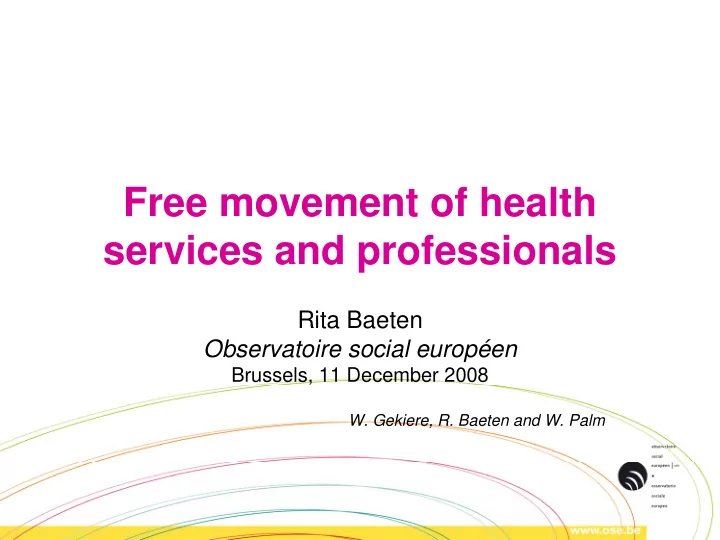

Free movement of health services and professionals Rita Baeten Observatoire social européen Brussels, 11 December 2008 W. Gekiere, R. Baeten and W. Palm
Forms of free movement of services 1.Freedom to provide services ( temporarily ) a. Consumer/ patient goes to a provider abroad (= patient mobility ) b. Provider provides temporarily care in other MS c. Service moves (e.g. telemedicine) 2. Provider establishes permanently abroad
Free movement: a double dynamic 1. Positive integration: Harmonisation at EU level (= Secondary legislation) 2. Negative integration: Deregulation: remove unjustified restrictions – Direct application of Treaty rules – Important role of the European Court of Justice – Not politically negotiated – Objective is economic, not social
Secondary legislation • Directive 2005/36/36 : Recognition of health professionals’ qualifications • Based on Treaty Article 47(3) • Minimum training requirements and mutual recognition of diploma’s
Free movement of services • No restriction of the free movement Unless: – Necessary : general interest objective – Proportional : • Suitable for securing the attainment of the objective • Can not go beyond what is necessary to attain the objective
Restriction? From • Direct (or indirect) discriminatory measures to • Measures that apply without distinction to domestic providers and providers from abroad but “ which hinder or render less attractive the exercise of the fundamental freedoms ”
“Restriction”: consequence • Temporary provision : – no double regulatory burden – mutual recognition, country of origin rules • Permanent establishment : – challenges the very existence of regulatory measures – even without specific cross border element – providers can challenge regulation if it hinders their access to or exercise of the activity – almost any regulation in healthcare is a potential restriction
Potential restrictions • Access to and exercise of care activity • Quantitative and qualitative restrictions – Ownership rules; territorial planning; legal form (not for profit); authorisation for outpatient clinic; minimum staff levels; registration requirement... – Cf. Services Directive (Bolkestein), art.15
Infringement proceedings – pharmacies (7MS) – biomedical analyses laboratories (FR)
Justification: Public interest objective? • Protection of public health • Need for a balanced supply • Financial sustainability of the social protection system • Planning, prevent overcapacity • Prior authorisation – Ambulatory care: not justified – Hospital care: can be justified
Justification: Proportional? Can not exceed what is necessary to attain the objective – temporary provision : Mutual trust • quality standards: hospitals? • conditional – in the absence of UE level framework – other measures? Authorisation scheme – permanent establishment • least restrictive measure
European Court of Justice • opticians only 1 shop – not proportional ; (2005, Greece) • quota system for psycho-therapists based on established rights – necessity not proved (2007 Germany) • prohibition on television publicity for aesthetical surgery – not justified to protect public health (2008: Italy) • authorisation to set up a private outpatient clinic – conclusions A.G.: necessary (2008: Austria).
Justification • High burden of proof for regulating authorities: – all particular circumstances for each individual case, for an individual provider – provide evidence of what would happen without the restriction • General proportionality test for applying regulation to providers from abroad
Conclusions • Threshold for application of the Free Movement rules is low • High burden of proof for health regulators • Creeping application • Legal uncertainty; deregulatory effect • Fragmentation in systems, choice versus solidarity?
Recommend
More recommend